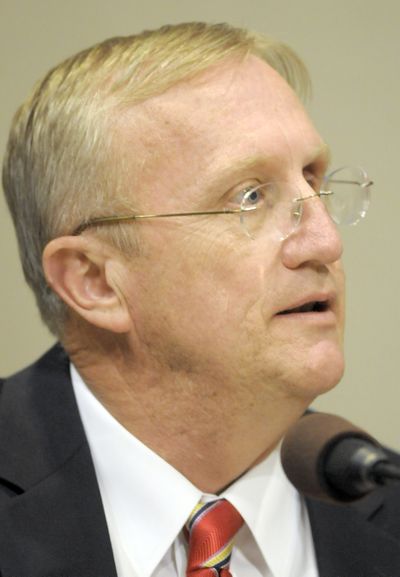Assessor discusses recovery from eye cancer
In early 2007, doctors told Baker to ‘get my affairs in order’

People who look closely might notice that one of Spokane County Assessor Ralph Baker’s eyes doesn’t move with the other.
They might even figure out that his left eye is a Plexiglas prosthesis. Children and dogs notice, but most adults don’t, Baker said Monday.
“Dogs used to have no problem with me, but now some stare and bark,” Baker said.
Otherwise, there’s little evidence of Baker’s 10-year odyssey with a cancer that was supposed to have killed him three years ago.
“My doctors advised me to get my affairs in order,” Baker said of the day in early 2007 that he learned a melanoma tumor behind his eye had returned and spread to his liver. “That was a very difficult day.”
But Baker responded as he did in 2003 when he was told to have the entire contents of his left eye socket removed. He looked for and found alternatives.
As a result of cutting-edge treatments and an experimental vaccine, Baker said he has been cancer-free for two years now. A tomography scan two weeks ago confirmed that, he said.
Baker decided to discuss his cancer publicly after learning Spokane talk-radio host Mike Fagan – an ally of anti-tax initiative writer Tim Eyman – planned to address it on his show.
Baker’s challenger in the Nov. 2 general election, property appraiser Vicki Horton, said she saw no reason to make the incumbent’s cancer battle a campaign issue.
“All of us in the office knew about his eye, but I didn’t realize it was anything that needed to be publicized,” said Horton, a fellow Republican who works for Baker.
Horton said she lost her mother to cancer three years ago and “it’s a horrible thing for the family to have to go through.”
Still, Baker said, “you can live a long life with cancer.
“It hasn’t affected my performance at all,” Baker said, noting his cancer began before he was hired as chief deputy assessor in 2003.
He said he seldom takes vacations and has missed very little work because of his treatments.
“I think he’s taken vacation maybe a week,” said Chief Deputy Assessor Kevin Best. “He’s here all the time.”
Baker said he hopes talking about his experience will help other cancer victims, whom he urges to maintain hope and take an active role in finding treatments.
He said he became aware that something was wrong in February 2000 while he was working as a stockbroker and his wife, Kyong, fell on ice. Baker said he took her for tests and was told, “She’s going to be OK, but you look terrible.”
A computerized tomography scan revealed what was believed to be a cyst behind his left eye. It caused no pain, and doctors monitored it until it grew large enough that one of them recommended a biopsy.
The biopsy revealed a rare tumor caused by melanoma, a cancer usually associated with skin.
Confronted with a recommendation to remove the contents of his eye socket and cover it with a patch, Baker got on the Internet and found eye specialist Dr. Jerry Shields in the footnotes of a technical paper.
Shields examined Baker at the Wills Eye Hospital in Philadelphia and implanted a radiation-seeded metal plate behind his eye to kill the cancer cells.
The treatment apparently was successful, and Baker’s distorted vision improved.
“I was clear (of cancer) for almost two years,” Baker said.
Then, in 2007, the eye tumor returned along with a 1.3-centimeter tumor in Baker’s liver. It was stage 4 melanoma, as bad as it gets.
“Stage 5 is six feet under,” Baker said.
He said he got his affairs in order as recommended, but he also went back to Dr. Shields for a different radiation treatment of his eye.
Ultimately, the treatment caused painful glaucoma and the eye had to be removed, but Shields referred Baker to another Philadelphia doctor, Takami Sato, who specializes in melanoma that has spread.
Sato advised Baker to apply for a clinical trial of cancer-fighting vaccines at the Hoag Cancer Center in Newport Beach, Calif. For the trial, cells from his liver tumor were grown in a laboratory.
It took seven months to grow 70 million cells, enough for eight shots of a vaccine designed to “teach” Baker’s antibodies that the cancer cells should be attacked. He said he made one-day flights to and from Newport Beach and returned to work the next day despite short-lived muscle spasms and flulike symptoms.
Baker paid for airfare, but the vaccinations were free, and his military-subsidized medical insurance covered the rest of his treatment. A retired Air Force lieutenant colonel, Baker spent nearly 25 years as a nuclear weapons officer, which he suspects may have contributed to his cancer.
“The cancer vaccine appears to have worked,” Baker said. “The proof is in time. Only time will tell.”